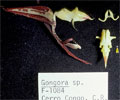|
|
|
|
| Register Yourself at Meyers Conservatory |
To register yourself with the Meyers Conservatory web site, please click the button
below and follow the instructions. You may just make a simple registration with your
email address and a password, but to use the advanced features like the Wish List
you should follow the registration process all the way into the User Information Page
where you can specify plants you are interested in and decide what kind of notifications
you will get.
|
|
|
|
|
| |
Flasks of
Gongora odoratissima 'UF-1082' (yellow lip) × self |
|
| |
|
|
| |
| Number: |
TN6430 |
| Name: |
Gongora odoratissima 'UF-1082' (yellow lip) × self
|
| Type: |
self (What's that?) |
|
Click to Enlarge

Pod Parent Herbarium Specimen |
|
|
|
| |
For additional origin/habitat information supplied courtesy of
Charles and Margaret Baker, see further below, near the bottom of this page.
|
Temperatures we attempt to use in the lab & greenhouse:
| For Species: |
|
Spring, Summer, Autumn, Winter: days average 82°F, nights 70°F; best fit is Warm-Intermediate 87-64°F
(Source:
Baker's Web OSC) |
|
About the name...
| Etymology of |
Gongora |
|
Named for Don Antonio Caballero y Góngora, viceroy of New Granada (Colombia) during the 18th century.
(Source:
Pridgeon 1992) |
| Etymology of |
odoratissima |
|
From Latin "odoratissimus" very highly scented.
(Source:
Brown 1956) |
| Pronunciation of |
Gongora |
|
GON-goe-ra
(Source:
Pridgeon 1992) |
| Pronunciation of |
odoratissima |
|
oh-doe-rah-TIS-i-ma
(Source:
Hawkes 1978) |
|
If you would like to direct someone to this web page, please copy and paste this URL into your email:
http://troymeyers.com/d?016430
| Flask Information |
| Availability: |
We have sold all of the flasks for this item. |
| You should: |
Consider getting individual plants or compots instead of a flask.
You can place a "Notify Flask Recipients" Request, and either we or a flask recipient may contact you when plants are available.
You may also place a "Notify Retries" Request, and if an identical pollination (the same parents) is done again, we'll let you know.
You may reserve a flask, but it's very unlikely you'll get one ...this could only happen if we found a flask that we didn't know we had. |
| Yield Estimate: |
240 plants (based on flask surveys done 10/08/2008 through 03/11/2009)
|
| Plantlet Sizes: |
From many flasks 45 - 100 mm plants (based on flask surveys done 03/03/2009 through 06/30/2009)
From one most recently surveyed flask 60 - 100 mm (06/30/2009)
|
|
You might also want to:
|
View the seed assay for this item.
View items of the same species.
View items of the same genus.
|
| Ordering Information |
| You are not currently logged in. |
|
You must be a registered user and be logged in to reserve a flask or place a notification request. Please log in:
|
|
| Register Yourself at Meyers Conservatory |
To register yourself with the Meyers Conservatory web site, please click the button
below and follow the instructions. You may just make a simple registration with your
email address and a password, but to use the advanced features like the Wish List
you should follow the registration process all the way into the User Information Page
where you can specify plants you are interested in and decide what kind of notifications
you will get.
|
|
|
|
|
|
|
|
| |
The origin/habitat information below is supplied courtesy of Charles and Margaret Baker
The following information is based on the name of the plant provided by the donor, and assumes that the name is correct. If the plant has been misidentified, then the following information may not be correct.
This text is copyrighted by the Bakers and may not be reproduced without permission.
ORIGIN/HABITAT: Venezuela and possibly Colombia. Except for the fact that
Lemaire mentioned that nothing was known of the history of this plant
apart from the fact that it had originally been found at La Guayra in
Venezuela, details of the exact habitat location and elevation of the
habitat of this species appears to be a well-kept secret. In addition,
there have been unconfirmed reports that plants were found near Magdalena
in Colombia. See Jenny (1993) for a complete history of this species. For
many years, many writers erroneously considered this species a synonym of
Gongora quinquenervis, so we are uncertain as to exactly which species was
being discussed in the older literature where Gongora odoratissima was
listed as a synonym. As a result of the uncertainty of the available
information and the fact that we have no climatological records for La
Guayra (now La Guaira?), we have elected to used the closest coastal
station to this location and have estimated the habitat elevation based
primarily on supposition on our part. Therefore, the resulting climate
table and cultural suggestions should be used with a great deal of
caution.
More about this information and the Bakers...
|
|
|
| |
|
|
|